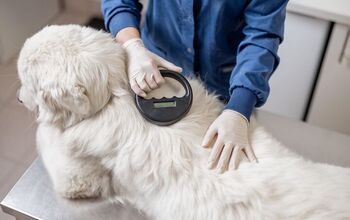Oxytocin’s Role In Dog-Human Bonding May Lead To Autism Therapies

Swedish researchers fromm Linkoping University in Sweden believe that there is a common genetic link or social behavior in dogs that humans have figured out and has helped lead to the domestication of dogs, focusing on the relationship that oxytocin plays in such behaviors.
Oxytocin is also known as the ‘love hormone’ and Professor Per Jensen, who coordinates the GENEWELL project, said his team looked at stress responses in dogs, particularly looking at oxytocin’s relationship and how it affects the bond between humans and dogs.
Related: Therapy Dogs Help Children With Autism More Than We Thought
Professor Jensen said that oxytocin plays an important role in contact between dogs and their owners, and they came to this conclusion using saltwater and oxytocin sprays. The researchers sprayed one or the other on the dogs’ noses and then watched as they approached different tasks.
Many of the dogs who were sprayed with oxytocin looked to their owners to help them if a task was too difficult, and many quicker than the dogs who just received sprays with saltwater, though the time it took for dogs to look for help was still inconsistent in the oxytocin-sprayed dogs.
The researchers saw that some dogs, all of whom who had a particular brain receptor, were strong responders to the oxytocin spray. They were the ones who looked to their owners quickly for help, compared to the other dogs. For oxytocin to work, the brain must allow it to attach to a receptor. Dogs have different types of oxytocin receptors based on their genes.
In other research that has been done on wolves, the wolves almost never turned to any human to help, regardless of task complexity. When researchers looked at the DNA samples of the wolves, they found some of variants of the oxytocin receptors that dogs are known to possess. This makes the researchers believe that wolves who possess these types of oxytocin receptors may lead them to be more engaging with humans, and therefore more easily domesticated in past time. While it may not be the reason that wolves first became domesticated, the researchers believe that it could have been a contributing factor.
Once the researchers discovered the receptor gene connection, they analyzed the dogs’ genomes. They found five that were most stronly associated with a dog’s behavior to seek help. Professor Jensen says that in humans, these genes are also associated with schizophrenia, autism and ADHD. He believes that this knowledge may lead to using dogs to help study social disorders in humans.
Related: Study: Therapy Dogs Help ASD Children Improve Social Skills
It’s already thought that giving oxytocin to people with social disorders can have therapeutic effect. For instance, oxytocin increases lead to a greater chance that a dog (or person) will look someone in the eyes, which is often an uncommon trait in those with autism. Dopamine also has a correlational effect as part of the reward system in the brain and researchers believe that together, those two chemicals help encourage social and cooperative behavior traits.
An EU-funded genetic project, BIOSOCIOCOG, is using this information to see whether drugs for social disorders should look at using both dopamine and oxytocin now, in order to develop new and effective treatment methods.

More by Lori Ennis























